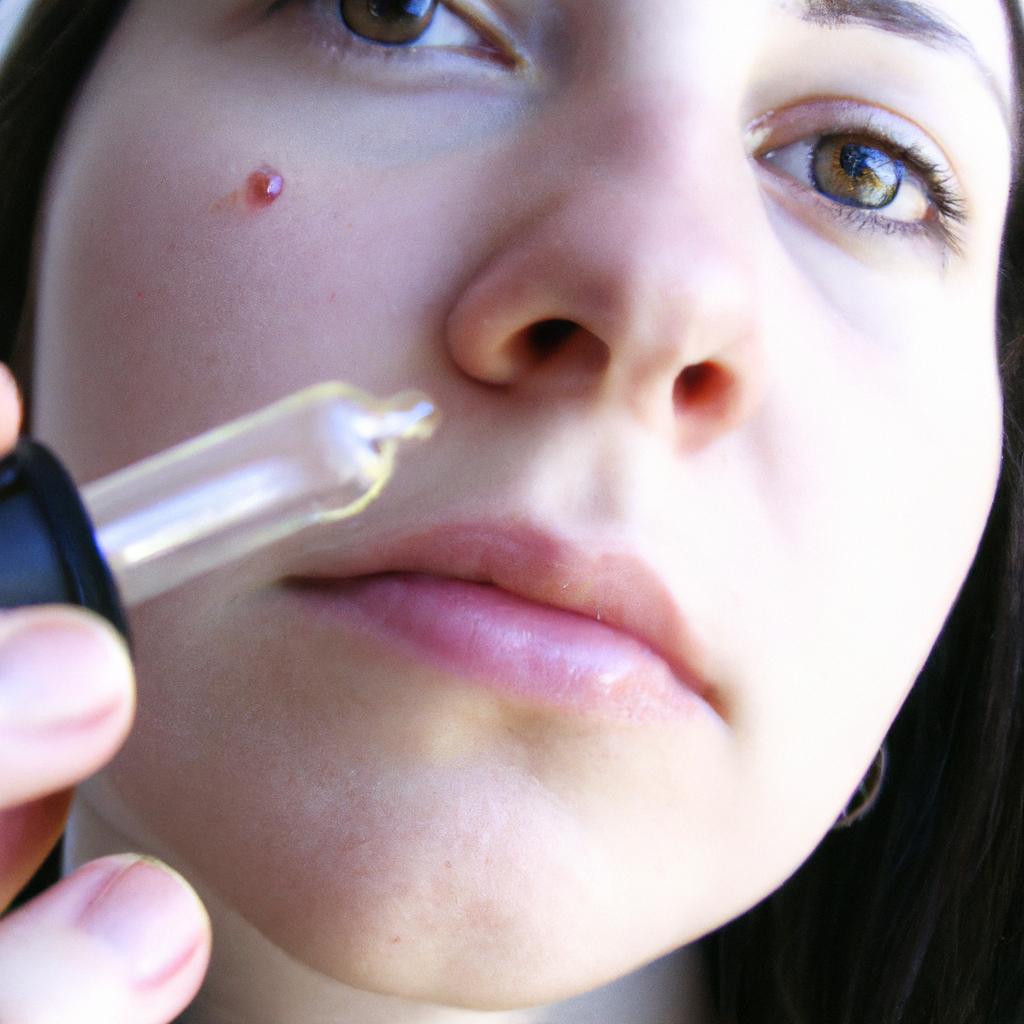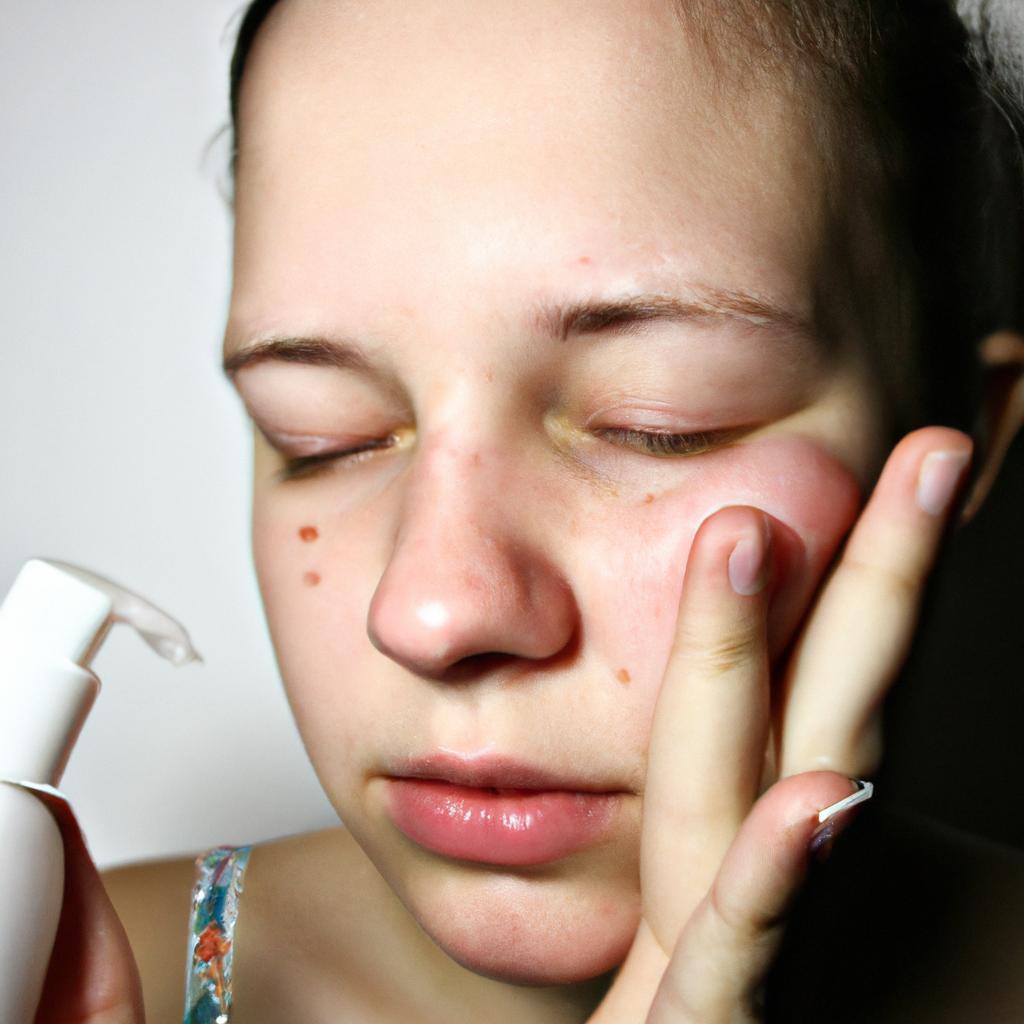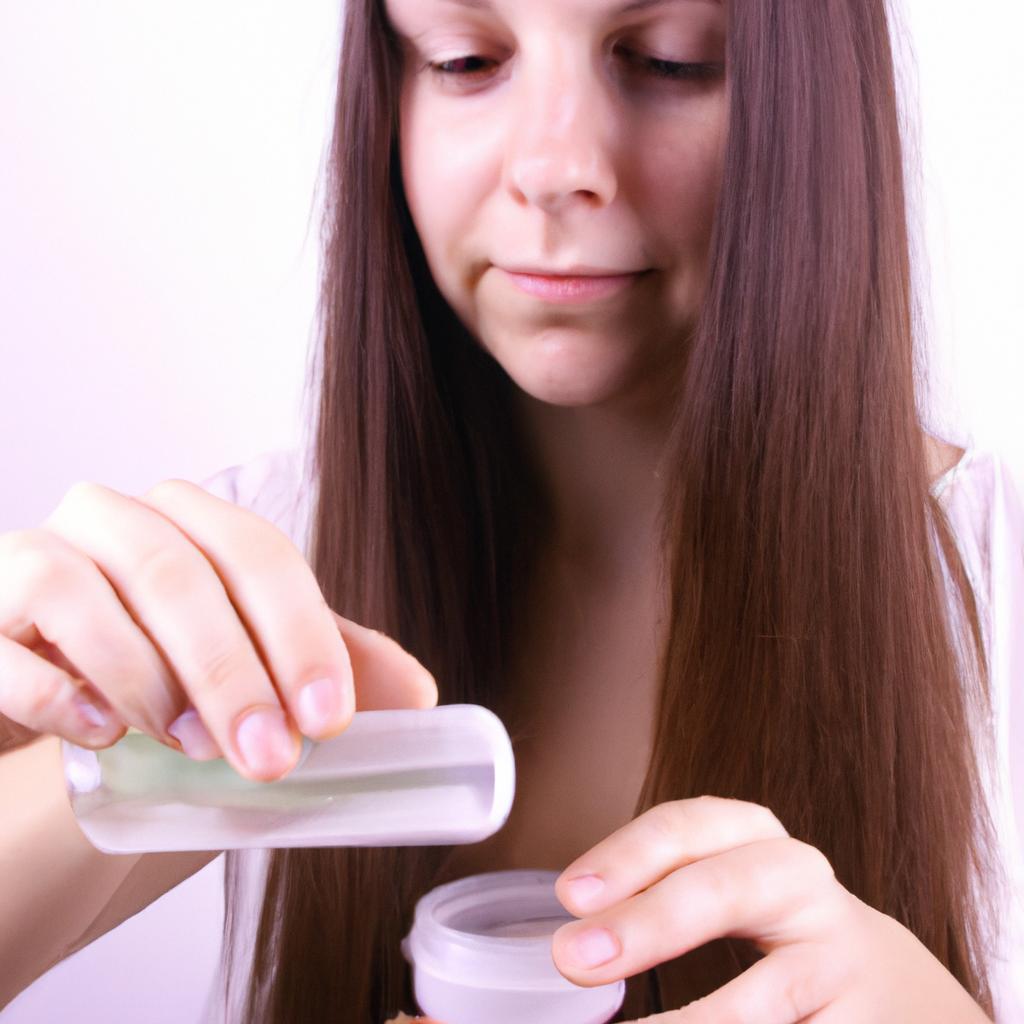The use of face masks in skincare routines has become increasingly popular in recent years, with individuals seeking to enhance the health and appearance of their skin. One remarkable example is Sarah, a 35-year-old woman who struggled with dry and dull skin for years. Despite trying various moisturizers and cleansers, she found little improvement until incorporating a mask into her daily routine. This case study highlights the potential benefits that masks can offer in addressing specific skincare concerns.
Within the realm of skincare products, masks hold a unique position as they provide targeted treatment for various skin issues such as acne, dehydration, aging signs, and hyperpigmentation. Unlike other everyday products like cleansers or moisturizers that are applied only briefly before being washed off or absorbed by the skin, masks are designed to stay on the face for an extended period. This prolonged contact allows for deeper penetration of active ingredients while providing additional time for them to work effectively. Consequently, masks have garnered attention from both consumers and dermatologists alike due to their ability to deliver potent formulations directly to the skin’s surface. The purpose of this article is to explore how incorporating a mask into your skincare routine can be a crucial step towards achieving healthier and more radiant-looking skin.
Why You Need a Mask
Imagine waking up one morning with dry, dull skin and feeling frustrated because your usual skincare routine isn’t working anymore. This scenario is all too common for many individuals who neglect to incorporate a mask into their skincare regimen. Masks are an essential component that can revitalize and rejuvenate your skin, offering numerous benefits that go beyond what daily cleansers and moisturizers can achieve.
Firstly, masks provide deep cleansing properties that effectively remove impurities from the skin’s surface. While regular cleansers may only target superficial dirt and oil buildup, masks work on a deeper level by penetrating the pores and eliminating toxins. By using a mask once or twice a week, you can unclog your pores and prevent acne breakouts caused by trapped debris.
In addition to purifying the skin, masks also offer intense hydration. With various types available, such as sheet masks or gel-based formulas infused with nourishing ingredients like hyaluronic acid or ceramides, these products deliver moisture directly to the skin cells. The resulting plumpness and luminosity not only enhance your complexion but also serve as a preventive measure against premature aging.
To further emphasize the importance of incorporating a mask into your skincare routine, consider the following:
- Relaxation: Taking time out of your busy schedule to pamper yourself with a mask allows for moments of relaxation and self-care.
- Self-confidence boost: Achieving healthy-looking skin boosts self-esteem and confidence in both personal and professional settings.
- Enhanced efficacy: Using targeted masks alongside other skincare products enhances their effectiveness by providing concentrated treatments.
- Customization: With various options available, masks cater to specific concerns such as brightening, firming, soothing or clarifying.
Emphasizing these emotional aspects will help create an engaging connection between readers and the topic at hand. To further illustrate this point visually:
| Benefits | Description |
|---|---|
| Relaxation | Masks provide a sense of calm and relaxation, allowing you to unwind from daily stressors. |
| Self-confidence boost | Clear, radiant skin can boost your self-esteem and give you the confidence to tackle any situation. |
| Enhanced efficacy | By incorporating masks into your routine, other skincare products become more effective as they work in synergy. |
| Customization | With a wide range of options available, masks allow for targeted treatments tailored to individual needs. |
In conclusion, adding a mask to your skincare routine is crucial for achieving optimal skin health. Not only do masks offer deep cleansing and intense hydration benefits, but they also promote relaxation and self-confidence while enhancing the effectiveness of other skincare products.
*[H2]: Heading 2
The Benefits of Using a Mask
Having established the importance of incorporating a mask into your skincare routine, let us now delve into the numerous benefits that come with using this essential product. To illustrate its effectiveness, consider the case of Sarah, a busy working professional who was struggling with dull and tired-looking skin. Upon introducing a nourishing mask into her weekly regimen, she noticed significant improvements in both texture and radiance.
There are several compelling reasons why you should consider adding a mask to your skincare arsenal:
-
Deep Cleansing: Masks have the ability to penetrate deep into the pores, drawing out impurities such as dirt, oil, and dead skin cells that can clog them. This thorough cleansing helps prevent breakouts and leaves your skin feeling refreshed and rejuvenated.
-
Hydration Boost: Many masks are formulated with hydrating ingredients like hyaluronic acid or glycerin. These components work to replenish moisture levels in the skin, helping combat dryness and improving overall hydration. By providing an extra surge of moisture, masks effectively plump up the skin’s appearance for a youthful glow.
-
Targeted Treatment: Different masks cater to specific skincare concerns, allowing you to address individual needs effectively. Whether it is reducing fine lines and wrinkles or soothing irritated skin, there is a wide range of options available that target various concerns and provide tailored solutions.
-
Relaxation and Self-Care: Applying a face mask can be an enjoyable self-care ritual that promotes relaxation and stress reduction. Taking some time for yourself allows you to unwind while simultaneously caring for your skin – talk about a win-win situation!
- Reveal radiant skin
- Experience improved hydration
- Address specific skincare concerns
- Indulge in self-care bliss
Table showcasing different types of masks:
| Type of Mask | Key Benefit |
|---|---|
| Clay Mask | Deep cleansing and oil control |
| Sheet Mask | Intense hydration and nourishment |
| Sleeping Mask | Overnight rejuvenation |
| Exfoliating Mask | Gentle removal of dead skin cells |
Incorporating a mask into your skincare routine not only offers tangible benefits, but it also provides an opportunity to indulge in self-care. By enjoying the process of applying a mask, you can enhance your overall well-being while achieving healthier-looking skin.
As we’ve explored the advantages masks bring to your skincare regimen, let’s now delve into understanding the different types of masks available in the market and their specific functions.
Different Types of Masks
After exploring the numerous benefits of incorporating masks into your skincare routine, let us now delve into the different types available in the market. Understanding their unique qualities and how they cater to various skin concerns will enable you to choose the right mask that suits your needs.
Different Types of Masks:
When it comes to masks, there is an extensive range available, each designed with specific ingredients and formulations to address diverse skin issues. Let’s consider an example scenario where someone is dealing with dry and dull skin due to excessive exposure to environmental pollutants.
To combat these effects, several options can be considered:
-
Hydrating Masks:
- Provide intense hydration and replenish moisture levels.
- Ingredients like hyaluronic acid help retain water within the skin.
- Example product: Hydro Boost Hydrogel Sheet Mask by Neutrogena.
-
Detoxifying Masks:
- Purify pores and eliminate impurities through deep cleansing.
- Charcoal or clay-based formulas draw out toxins and excess oil.
- Example product: Indian Healing Clay by Aztec Secret.
-
Brightening Masks:
- Enhance radiance and improve overall complexion.
- Contain ingredients such as vitamin C or niacinamide for brightening effect.
- Example product: Glow Recipe Watermelon Glow Sleeping Mask.
-
Soothing Masks:
- Calm irritated skin, reduce redness, and provide relief.
- Incorporate soothing agents like aloe vera or chamomile extract.
- Example product: Cucumber Gel Mask Extreme De-Tox™ Hydrator by Peter Thomas Roth.
Consideration of individual preferences, specific skin concerns, and desired results will guide you in selecting the most suitable mask for your skincare routine. Now that we have explored the different types of masks available, let’s move on to understanding how to choose the right mask for your skin type.
Transition into the subsequent section:
In order to make an informed choice regarding a mask that works best for you, it is crucial to understand how various factors influence its effectiveness and compatibility with your skin type. Let us now explore how to choose the right mask based on these considerations.
How to Choose the Right Mask for Your Skin Type
Understanding the different types of masks is crucial when it comes to selecting one that suits your skin’s specific needs. Now, let’s explore how to choose the right mask for your unique skin type.
Choosing a suitable facial mask can greatly enhance your skincare routine and provide targeted benefits. For instance, imagine having oily skin prone to acne breakouts. In this case, using a clay-based mask enriched with salicylic acid can help absorb excess oil and unclog pores, leading to clearer and healthier-looking skin.
To assist you in making an informed decision, here are some considerations when choosing a mask tailored to your skin type:
- Ingredients: Look for key ingredients that address your specific concerns. For dry or sensitive skin, opt for masks containing hydrating elements like hyaluronic acid or soothing agents such as aloe vera. If you have combination or oily skin, seek out masks infused with purifying ingredients like charcoal or tea tree oil.
- Formulation: Consider whether you prefer wash-off masks, peel-off masks, or sheet masks. Each formulation offers its own set of advantages based on convenience and personal preference.
- Frequency: Determine how often you plan to use the mask. Some products are designed for daily use, while others may be recommended only once or twice a week.
- Sensitivity: Take into account any known sensitivities or allergies you may have towards certain ingredients commonly found in masks. Avoid formulations that could potentially irritate your skin further.
By considering these factors carefully, not only will you find a mask that caters specifically to your needs but also take steps toward achieving healthy and radiant-looking skin.
Using the right face mask can:
- Revitalize dull skin, leaving it with a healthy glow
- Minimize the appearance of pores and blackheads for a smoother complexion
- Provide deep hydration, resulting in plumper and more supple skin
- Reduce redness and inflammation, promoting an overall calmer complexion
Emotional table:
| Skin Type | Recommended Mask | Key Benefits |
|---|---|---|
| Dry | Hydrating sheet mask | Deeply moisturizes |
| Oily | Charcoal peel-off mask | Absorbs excess oil |
| Combination | Clay-based wash-off mask | Balances sebum production |
| Sensitive | Aloe vera gel mask | Soothes and calms |
Incorporating these emotional elements into your skincare routine will not only improve the condition of your skin but also boost your confidence and self-esteem.
Understanding how to choose the right mask is essential, but equally important is knowing how to use it effectively. In the following section, we’ll provide you with a step-by-step guide on incorporating masks into your skincare regimen seamlessly.
Step-by-Step Guide to Using a Mask
Transitioning from our discussion on the importance of masks in your skincare routine, it is crucial to understand how to choose the right mask for your specific skin type. Let’s explore some factors to consider when selecting a mask that will address your unique needs.
For instance, imagine you have oily skin prone to breakouts. In this case, you would want to look for a clay or charcoal-based mask that can effectively absorb excess oil and unclog pores. On the other hand, if your skin tends to be dry and lacks hydration, opt for a moisturizing mask containing ingredients like hyaluronic acid or shea butter to nourish and replenish moisture levels.
When choosing a mask, keep in mind the following considerations:
- Ingredients: Look for masks with ingredients tailored specifically to your skin concerns. For example, tea tree oil is known for its antibacterial properties and can be beneficial for acne-prone skin.
- Texture: Consider whether you prefer a creamy texture or something more lightweight and gel-like. Finding a texture that appeals to you will enhance your overall masking experience.
- Frequency: Determine how often you plan on using the mask. Some products are designed for daily use, while others should only be used once or twice per week.
- Sensitivity: If you have sensitive skin, opt for masks labeled as gentle or suitable for sensitive skin types. These formulations are less likely to cause irritation.
To further illustrate these points, here is an example table showcasing different types of masks based on common skin concerns:
| Skin Concern | Recommended Mask |
|---|---|
| Acne | Clay or charcoal-based mask |
| Dryness | Hydrating or sheet mask |
| Dullness | Brightening or exfoliating mask |
| Aging | Anti-aging or collagen-infused |
In conclusion, selecting the right mask for your skin type is crucial to ensure maximum benefits. By considering factors such as ingredients, texture, frequency of use, and sensitivity, you can tailor your masking experience to address specific concerns effectively.
Now that we have discussed choosing the right mask for your skin type, let’s move on to a step-by-step guide on how to use a mask properly.
Tips for Maximizing the Effects of a Mask
As we continue our exploration of the benefits of using a mask in your skincare routine, let’s delve into some valuable tips for maximizing its effects. Imagine this scenario: Sarah, a busy professional with an active lifestyle, has been struggling to maintain healthy-looking skin due to stress and environmental factors. She decides to incorporate a mask into her skincare routine and seeks guidance on how to make the most out of this essential product.
To begin with, it is crucial to choose the right type of mask that suits your specific skin concerns. Options range from clay masks for oil control and pore cleansing to sheet masks for hydration and brightening. Consider consulting with a dermatologist or esthetician who can help you determine which mask will best address your needs.
Once you have selected an appropriate mask, follow these steps for optimal results:
- Cleanse: Begin by thoroughly cleansing your face to remove any dirt, oil, or makeup residue. This ensures that the mask can penetrate deeply into your pores without any barriers.
- Exfoliate (if necessary): If your skin requires exfoliation, gently scrub away dead cells using a mild exfoliant before applying the mask. This step helps enhance absorption and allows the ingredients within the mask to work more effectively.
- Apply evenly: Use clean hands or a brush/spatula designed for application and spread an even layer of the mask onto your face, avoiding sensitive areas such as eyes and lips.
- Relax and wait: Once applied, give yourself time to unwind while allowing the mask to work its magic. Follow the instructions provided with your chosen product regarding duration – typically ranging from 10-20 minutes – as leaving it on too long may lead to dryness or irritation.
- Refresh: Masks offer a rejuvenating experience that allows you to take a break from daily stresses and pamper yourself.
- Nourish: The concentrated ingredients in masks provide an extra dose of hydration, nutrients, and active compounds to revitalize your skin.
- Transform: Regular use of masks can help improve the appearance of dullness, uneven texture, and fine lines, revealing a more vibrant complexion.
- Self-care: Incorporating a mask into your routine allows you to indulge in self-care rituals that promote both physical and mental well-being.
To further illustrate the versatility of masks, let’s consider the following table showcasing different types and their key benefits:
| Mask Type | Key Benefits |
|---|---|
| Clay Masks | Absorbs excess oil and tightens pores. |
| Sheet Masks | Provides intense hydration for dry skin. |
| Gel Masks | Soothes inflammation and calms sensitive skin. |
| Cream Masks | Delivers nourishment and improves elasticity. |
By understanding these tips and recommendations, like Sarah, you too can incorporate masks effectively into your skincare regimen. Achieve healthier-looking skin while enjoying moments of relaxation and indulgence – all with the power of this essential product at your disposal.
 Stanley Beauty Care
Stanley Beauty Care



